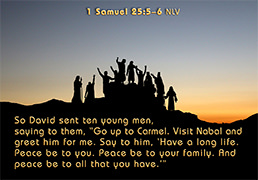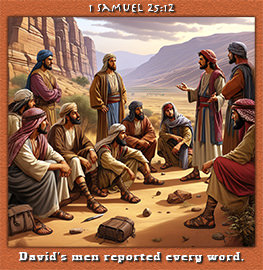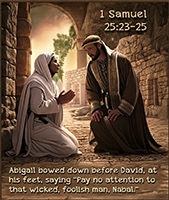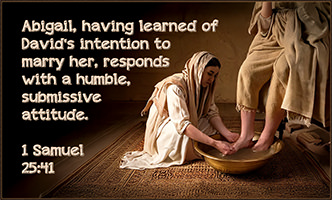1 Samuel 25:1–44 . . . Bible Study Summary with Videos and Questions
“David, Nabal, and Abigail”
This chapter of 1 Samuel takes place at a low point in David's life, which might explain why he didn't act honorably herein. It starts with the announcement of the death of Samuel, David's mentor; it concludes with Saul treating David as though he were dead. David isn't the hero of this chapter; a woman named Abigail is. God used a woman to avert a tragedy in Israel's history.
Looking back at last week's summary, chapter 24 is certainly one of the high watermarks of David’s faith. When King Saul stopped at a cave to use its restroom, he unknowingly put his life in the hands of David and his men, hiding at the back of the cave. David refused to raise a hand against the king, forbidding his men to harm him. He even regretted his cutting off a portion of King Saul’s robe. Finally, he put himself at great risk by revealing himself to the king, to show him that he was a faithful servant, not a criminal waiting for the right moment to take the king’s life.
Here in chapter 25, David will lose his temper when a foolish man insults him. He'll be ready to kill this rich fool and the males in his household. Fortunately, a wise woman, at her own risk, will act to hopefully spare her foolish husband’s life and keep David from also acting foolishly. Let's look carefully at Abigail — foolish Nabal’s wife — not only as a beautiful, wise woman, but an example of godly submission.
[Note: Click the link to This Week’s Passage near the bottom of this page to read today’s Scripture.]
Samuel Dies, David Suffers a Great Loss (25:1–8)
25 1Now Samuel died, and all Israel assembled and mourned for him; and they buried him at his home in Ramah. Then David moved down into the Desert of Paran (1 Sam. 25:1).
Samuel's years of being a blessing to all Israel came to an end. David took his place as God's major channel of blessing to the nation. It's appropriate that the notice of Samuel's death occurs here because Saul had just publicly admitted that David would be Israel's next king (24:20). Samuel's ministry of providing a transition to the monarchy had therefore ended. People all over Israel mourned the death of Samuel, the last of the judges. Josephus wrote that Samuel, alone, governed over Israel after Eli's death, for 12 years, then for 18 years with King Saul. David would probably have continued Samuel's ministry and become Israel's first king without the hiatus of Saul's tragic reign, if Israel hadn't insisted on having a king prematurely.
Samuel's been one of the central personalities in 1 Samuel: He designated and anointed Saul as Israel’s first king (chapters 9 and 10); he was the prophet who informed Saul that his kingship would be taken away (chapters 13 and 15); he anointed David as Saul’s replacement (chapter 16); and he was a man to whom David could flee when he was pursued by Saul (19:18–24).
What a great loss David must have sensed with Samuel's death. Plus, David had met with his beloved friend Jonathan for the last time (chapter 23), and we'll learn herein that his wife Michal (Saul’s daughter) will become the wife of another man (25:44). On top of all this, David’s parents have been placed in the king of Moab's care (22:3). How lonely David must have been. He and many other Israelites went to Samuel’s home at Ramah where he mourned for Samuel, the great man of God. After his mourning, he once again went into hiding in the wilderness of Paran.
Maon and Carmel ("Garden Spot," v. 2) were about 14 miles west of En Gedi. Reference to Nabal's 3,000 sheep may allude to Saul's 3,000 soldiers (24:2). As the story unfolds, we'll discover many similarities between Nabal and Saul. The writer may have dropped this and other clues to help us hearty readers compare both men.
"Nabal" must have been a nickname: it means "fool" in Hebrew. Nabal was a descendant of Caleb who'd received Hebron and its environs as his inheritance from Joshua (Joshua 15:13). Unlike his ancestor in many ways, Nabal was foolish while Caleb was wise; Nabal didn't take God into account, yet Caleb counted on God's promises; and Nabal opposed God's purposes and died prematurely while Caleb cooperated with God and lived long.
As well, the contrast between Nabal and his wife Abigail (lit. "[My] Father is Rejoicing" or "[My] Father was Delighted") couldn't be clearer. Someone has called this chapter the story of "Beauty and Beast." Theologian Dr. Robert Constable wrote this of their contrast: "Nabal was foolish while Abigail was wise; he was evil though she was good; he was repulsive, she was attractive; he was arrogant but she was humble; he was ungodly, she was godly; he was antagonistic, though she was peacemaking." They were one of the most mismatched odd couples of the book of Samuel.
David’s men had made the region safe from predators, which benefited Nabal’s shearers. It would have been common courtesy for Nabal to show appreciation by providing food that David’s men respectfully requested. David learned that Nabal was sheering his sheep. When sheering ends, all the workers would celebrate, as would anyone nearby who wasn't so fortunate. For David to ask Nabal for a gift wasn't unusual. And since David’s men had contributed to Nabal’s well-being and wealth, David’s request was most reasonable.
Nabal Responds to David Foolishly (vv. 9–13)
9When David’s men arrived, they gave Nabal this message in David’s name. Then they waited.
10Nabal answered David’s servants, “Who is this David? Who is this son of Jesse? Many servants are breaking away from their masters these days. 11Why should I take my bread and water, and the meat I have slaughtered for my shearers, and give it to men coming from who knows where?”
12David’s men turned around and went back. When they arrived, they reported every word. 13David said to his men, “Each of you strap on your sword!” So they did, and David strapped his on as well. About four hundred men went up with David, while two hundred stayed with the supplies (1 Sam. 25:9–13).
David sent ten young men to Nabal to greet him in David’s name and pronounce a blessing upon him and his household. Because David and his men had protected Nabal’s flocks and shepherds, he was encouraged to ask his servants to verify the truth of these words. So they politely asked Nabal for a gift, waiting patiently and expectantly for his response.
There David’s ten men stood before Nabal, waiting for a response; more specifically for a gift. Alas, Nabal failed to admit that David had been a blessing to him; he also refused to acknowledge David as the Lord's anointed. Being the jerk that he was, he refused the request and disrespected David. Not only did he know that David was a “son of Jesse,” he was also well aware of the tension between Saul and David. Nabal spoke of David as a “servant of Saul,” who was “breaking away from his master.” Abigail, Nabal’s wife, knew that David was the one designated to reign in Saul’s place (vv. 30–31). Nabal's final words of refusal to David’s messengers are noteworthy: Reread v. 11, shown above.
David overreacted to Nabal's insulting rebuff (v. 13). As we'll see in vv. 22 and 34, he prepared to attack and kill every male in Nabal's household that night. Indeed, David was at a low spot. When his men reported to him, his response was a bit of an overreaction: “Each of you, strap on your sword.” He took 400 men with him to visit Nabal. It wouldn’t be a social call!
Nabal’s Servant Appeals to Abigail (vv. 14–17)
One of Nabal’s servants appealed to Abigail, to reverse Nabal's orders, describing how David’s men acted honorably and that Nabal was a “worthless man” who'd disrespected God’s anointed one who was to become king. He testified that God had blessed Nabal's shepherds greatly through David and that his soldiers had been a wall of protection for them (v. 16). As was the case of Saul, Nabal's family and servants sided with David.
The servant didn't speak to Nabal; he quickly appraised Abigail of the situation and the need for decisive action. Apparently, this servant had a great regard for Abigail and her judgment, which is why he sought her out. He didn't suggest to Abigail what she should do; instead, he simply told her the facts and urged her to act with the wisdom she was known to have had.
Interestingly, the Hebrew words for "good" and "evil" each occur seven times in this chapter. Together they underscore one of the major themes of this story: Good brings its own reward, while evil recoils on the head of the wicked.
Abigail Prepares to Appeal to David (vv. 18–22)
This next passage shows what a wise and godly woman Abigail was. She sprang into action, gathering together food and animals to give to David and his men — thus heading him off from killing her husband and his household. As Abimelech had done earlier (21:4), she prepared to sustain the Lord's anointed, and his men, with food.
We must realize that wise Abigail didn't ask or inform Nabal about what she was doing, because she knew what Nabal’s answer would have been. We'll soon see that her actions are an example of true submission, while on the surface they don't appear to be. Acting quickly, she gathered up generous portions of food that she sent ahead with her servants. Speed was of the essence! David was on his way, determined to kill every male he'd encounter at Nabal’s house, including Nabal.
20As she came riding her donkey into a mountain ravine, there were David and his men descending toward her, and she met them (1 Sam. 25:20).
Having sent the food gift on ahead, Abigail worked her way down the mountain, out of sight to David and his men. He likewise went down from higher ground, still grumbling about Nabal’s insults and rehearsing what he'll do when he gets his hands on that ungrateful despot. Without either party recognizing what was happening, David and Abigail both converged on each other and are suddenly met, face to face.
Abigail’s Appeal (vv. 23–31)
Abigail's approach to David was a model of tact and courage: She took all the blame for her husband's foolish actions; she begged David to listen to her since her own husband wouldn't (cf. v. 17); Nabal had proudly described David as a runaway servant (v. 10), but Abigail presented herself humbly as a servant to David (v. 24). And she proceeded to help David view his situation from God's perspective; she referred to the Lord as the One who, in response to her words, had restrained David from shedding innocent blood (v. 26); she anticipated David's proper response to her appeal; she further wished that all who opposed David, as Nabal had done, would be ineffective; she presented her gift of food while asking for David's forgiveness, since her husband wasn't to forgive (v. 28); and she believed that Yahweh would give David an enduring dynasty because he fought the Lord's battles (v. 28), not just Saul's battles, and because he'd do the Lord's will.
As Abigail concluded her appeal to David, she requested that he'd remember her when he attained his throne (v. 31). She'd revealed that godly perspective that was totally absent in her husband.
David’s Response, Nabal’s Response (vv. 32–38)
Abigail’s words rang true to David who knew she was right; he admitted it by praising her before all of his men. He recognized that Abigail was literally a Godsend, and, by means of her words and deeds, God had kept him from the wrongdoing of taking vengeance against Nabal and thus shedding innocent blood. Had she not acted as quickly as she did, David would have carried out his deadly plan. She'd saved David from folly and guilt while sparing the life of her husband and every male in her household. Having granted her request, David accepted her gift and sent her home in peace.
Arriving home, Abigail discovered that her foolish husband was drunk from celebrating; he was totally oblivious to his mortal danger; he was feasting rather than fasting; he was behaving like a king, the ultimate authority, rather than like a servant of the next king. This is another allusion to the similarity between Nabal and Saul who both viewed themselves proudly as kings. Pride was the root of Nabal's folly as well as Saul's, and it preceded destruction in both cases.
Abigail wisely waited until morning before telling her husband what a close brush he'd had with death. By then the wine had gone out of him. The writer made a clever play on words here. The Hebrew word for "wineskin" is nebel. It's as though he was suggesting that Nabal was a nebel, and when the wine in him had been emptied; he became nothing. Nabal's heart died within him when he finally realized what a fool he'd been. God struck him dead for his pride and opposition to the Lord's anointed.
David Loses One Wife yet Gains Two (vv. 39–44)
Word reached David that Nabal was dead. He responded with gratitude, praising God for having removed the reproach of Nabal. David declared that it was God who'd indeed kept him from evil. He saw how much better it was to have left revenge in God's hands. The Lord removed Nabal, not David. That's the way it's supposed to go, and it was all due to the wise and prompt actions of a woman, Abigail.
That same woman quickly bowed to the ground, humbly accepting the marriage offer. However, she didn't look upon herself as David’s queen, but instead as his maidservant, who'd happily wash the feet of his servants. The final verses of this chapter inform us that Abigail was David’s second wife: He'd already taken Ahinoam of Jezreel as his wife; Michal had also been his wife, but, while David was hiding from Saul, the king gave Michal to Palti, the son of Laish, as his wife. The lovely lady agreed to David's proposal even though her husband's body wasn't cold yet. But we shouldn't blame her, since she'd already wasted too much of her life on a fool.
As mentioned from the top, this chapter opens and closes with a tragedy in David's life: the death of Samuel and the departure of his wife Michal, evidently because Saul considered David as good as dead.
† Summary of 1 Samuel 25:1–44
This passage opens with the death of the prophet Samuel, mourned by all Israel, after which David moves to the wilderness of Paran (25:1). The chapter introduces Nabal, a wealthy but harsh and foolish man from Maon, and his intelligent, discerning wife, Abigail (vv. 2–3). David, having protected Nabal’s shepherds in the wilderness, respectfully requests provisions during sheep-shearing season (vv. 4–8). Nabal rudely refuses, insulting David and denying his request (vv .9–11), which provokes David to gather 400 men to seek retribution (vv. 12–13, 21–22).
Abigail, learning of the impending disaster from a servant, acts swiftly and humbly approaches David with gifts and wise counsel (vv. 14–19, 23–31). She pleads with David to refrain from bloodshed and acknowledges his future as Israel’s ruler, reminding him to let God bring justice rather than taking vengeance himself (vv. 28–31). David accepts Abigail’s intervention and blesses her for preventing him from committing evil (vv. 32–35). When Abigail tells Nabal what happened, he suffers a fatal heart attack (vv. 36–38), and afterward, David marries Abigail, recognizing her wisdom and character (vv. 39–42).
Key points with verse references:
• The prophet Samuel dies, and all Israel mourns; David moves to the wilderness of Paran (v. 1).
• Nabal, a harsh and foolish man, refuses David’s request for provisions, responding with insults despite David’s kindness (vv. 2–13).
• Abigail, Nabal’s wise wife, intervenes by bringing food and humbly pleading with David not to take vengeance, thus preventing bloodshed (vv. 14–31).
• David recognizes Abigail’s wisdom, blesses God for stopping him from wrongdoing, and relents from his plan (vv. 32–35).
• Nabal dies after learning of the events; David marries Abigail, and his wife Michal is given to another man (vv. 36–44).
This chapter highlights the impact of wise intervention, the dangers of vengeance, God’s justice, and how God uses unlikely means — including the discernment of a courageous woman — to protect his anointed and shape the character of Israel’s future king.
This Week's Passage
1 Samuel 25:1–44
New International Version (NIV) [View it in a different version by clicking here; also listen to chapter 25 narrated by Max McLean].
† Summary Video: “The First Book of Samuel”
† Watch this introductory video clip created by BibleProject on bibleproject.com.
- Q. 1 What are a few things that Nabal and Saul have in common?
- Q. 2 Why did David seek to kill Nabal? Why did he react differently with Saul (24:4)?




